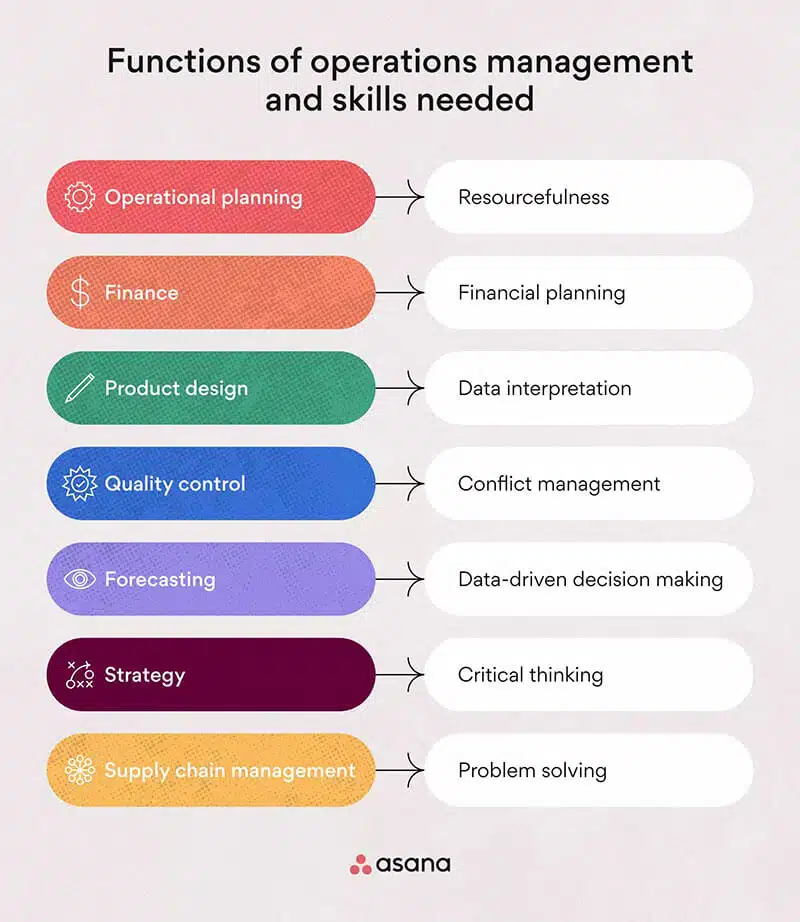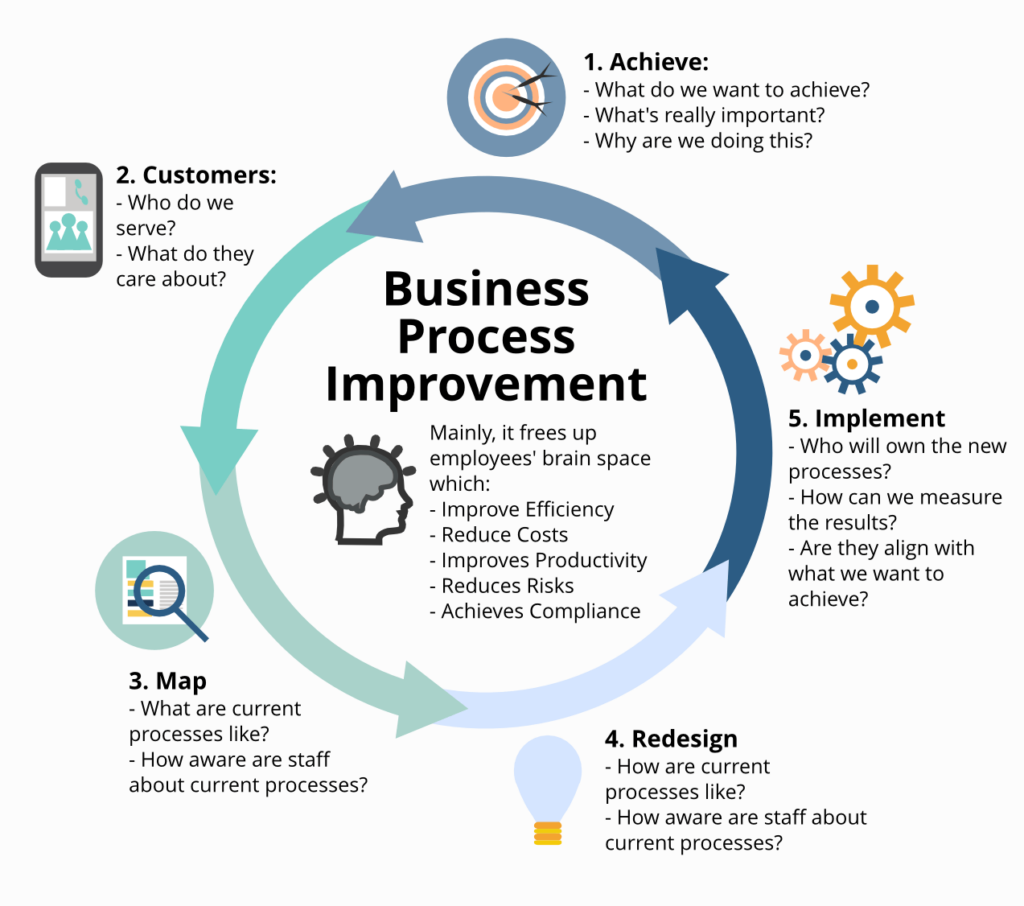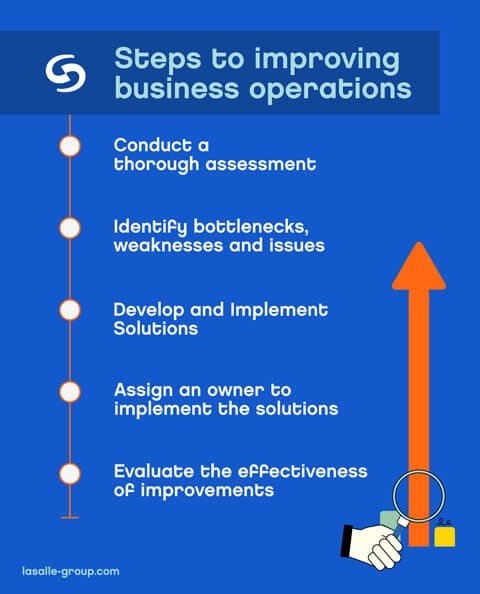Many things happen inside your business to drive success and growth. From choosing the right staff members to ensuring the goods you put out are of the highest quality. The daily tasks or activities that are conducted in your company are referred to as the company’s operations.
Each operation is critical in helping your business increase revenue and consistently strive toward better growth. This article discusses business operations and the essential functions you need to understand.

What Are Business Operations? Business Operations Refer to…
Let’s first consider what business operations are and what the term means. It’s an umbrella term that can refer to several organizational operations. You’ll have business operations regardless of your industry. If you focus on product design, manufacturing, retail, or service provision – each business type still has operations that affect growth and performance.
Manufacturing companies usually have more business operations to focus on than retail ones. Your operations usually start with the raw materials used in production. However, if you have a retail store, your operations start by buying products that manufacturing companies make. Thus, you cut out a couple of the steps or operations. Likewise, things will also be a bit different if you’re in the service industry or supply chain.
Today, some businesses are also attempting to automate specific operations departments. This helps to speed up the process of working with data, providing good customer service, and more. One survey found that 31% of companies have already automated one or more functions within the business. Strategic planning is crucial for ensuring that all departments, including the sales department, understand their roles and responsibilities in executing business operations and meeting company objectives.
Components of Business Operations
Business operations refer to the various activities that keep a company running smoothly and efficiently. These operations are composed of several key components that work together to achieve business success:
- Planning: Planning is the foundation of any successful business. It involves setting clear business goals, developing strategies to achieve those goals, and creating a comprehensive business plan. Effective planning ensures that all team members understand the company’s direction and objectives, which is crucial for coordinated efforts and achieving business success.
- Organization: Organization refers to structuring the business to optimize resource allocation and task assignment. This includes defining roles and responsibilities, establishing a hierarchy, and ensuring that resources are distributed effectively. A well-organized business can operate more efficiently, leading to better performance and higher productivity.
- Staffing: Staffing is about hiring the right people for the right positions and providing them with the necessary training. This component ensures that the business has a skilled and capable workforce to perform specific tasks and functions. Effective staffing is essential for maintaining high performance and achieving business goals.
- Directing: Directing involves leading and motivating employees to work towards the company’s objectives. This includes providing clear instructions, setting performance expectations, and offering support and guidance. Good leadership can inspire employees to perform at their best, contributing to overall business success.
- Controlling: Controlling is the process of monitoring and evaluating business performance to ensure that goals are being met. This involves setting performance standards, measuring actual performance, and making necessary adjustments. Effective controlling helps identify areas for improvement and ensures that the business stays on track to achieve its objectives.
Importance of Business Operations
Effective business operations are crucial for achieving business success. Here are some reasons why:
- Improved Efficiency: Well-planned and organized business operations can help reduce waste, increase productivity, and improve overall efficiency. By streamlining processes and eliminating unnecessary steps, businesses can operate more smoothly and cost-effectively.
- Increased Customer Satisfaction: Understanding customer expectations and consistently delivering high-quality products and services are key to improving customer satisfaction and loyalty. Satisfied customers are more likely to return and recommend the business to others, driving long-term success.
- Better Risk Management: Effective business operations can help identify and mitigate potential risks, reducing the likelihood of errors and losses. By proactively managing risks, businesses can protect their assets and ensure continuity in their operations.
- Increased Revenue: Streamlining business operations and improving efficiency can lead to increased revenue and profitability. By optimizing processes and reducing costs, businesses can enhance their financial performance and achieve their business goals.
- Competitive Advantage: Businesses that effectively manage their operations can gain a competitive advantage in their industry. By operating more efficiently and delivering superior products and services, they can set themselves apart from competitors and attract more customers.
By focusing on these key aspects of business operations, companies can enhance their performance, achieve their business goals, and ensure long-term success.
The Key Functions Of Business Operations

When successfully managing your business, you need to understand the key functions of operations management. One of the key executives involved in overseeing business operations is the chief human resources officer (CHRO), who works alongside other C-suite positions like COO and CFO. You can break business operations down into multiple categories, which makes it easier to see how your business performs and how effective your operations management strategies are. Understanding your company’s operations is crucial, as it involves the daily activities and processes that produce goods or services and increase revenue. We are going to discuss some of the most common business operations that company owners and management staff generally focus on.
Strategic Planning
With the right goals in place, it’s easier to do quality control and to understand how your business is doing. This is why planning operations play a crucial part in any company. Effective marketing strategies are essential in planning to promote products and engage the target audience. Whether you are part of the supply chain, offer custom-built products on customer demand, or have a retail store, you need a clear vision and know what you want out of business.
You’ve already gone through the process of setting up a business plan. This, however, does not mean planning is no longer necessary. Planning for projects you want to take on, changes you want to make in the business, and how services or products are delivered to your customers – these processes affect how effectively you can execute your business operations. Strategic planning also ensures staff members know their roles and the tasks they should perform. It’s also a great way to ensure everyone from the human resources team to the sales department has specific goals they need to reach.
Controlling
Being in control of your business is important. You need a broad view of what’s happening in every department and how well the business performs. This is where controlling operations come into the picture. Controlling involves monitoring your business and using strategic management strategies to measure progress and performance.
When there are problems in the business, or you notice that teams fail to meet their quota, it’s your responsibility to pinpoint the fault at hand. You are in control of implementing the changes necessary to rectify problems you notice while assessing business strategies and internal operations.
Staffing and Human Resources

Your business relies on the people who work for it. Keeping your business running without any hurdles is hard without the proper staff members. Staffing operations also play a crucial role in overall business management.
Staffing involves hiring the right people qualified for the specific positions that need to be filled. Additionally, it also involved ensuring the suitable teams are formed with staff members who can work together effectively. When you notice a learning gap among your staff members, business operations should also provide the appropriate training to ensure they can do their work without failure.
Organization
The operations manager needs to ensure the created plans can be implemented. This is where the organization comes into the picture. In a retail business, effective inventory management is crucial to meet customer demand and maximize revenue. Operations departments must ensure tasks are handed down to the right teams and resources are adequately distributed.
This helps to keep everything functioning the way it should. A well-organized business also has an easier way of ensuring customer satisfaction.
Directing
Another part of business operations is directing. Different management staff members can perform this particular operation. Directing employees means telling them exactly what they need to do and what a project expects of them. It can also include the announcement of goals the employees need to achieve, such as a specific sales number you expect from each employee within a given timeframe.
Directing also helps to add stability to the internal operations of your business.
Improving Business Operations

As a business owner, you expect your company to see consistent growth. This can only happen with proper operations management. When you do not have a system in place for your business operations, it can be hard to attend to your company’s requirements.
Improving operations management is definitely something that companies should strive toward consistently. This starts with regularly checking in on the operations manager and understanding how current operation management strategies work.
Measuring performance is very important in any business. You should not only measure the performance of your sales and revenue but also analyze your internal operations regularly. Your company goals must be accurate and actionable – this improves productivity and helps avoid confusion among your employees. For example, it’s easier to measure a goal of increasing sales by 50% within 12 months than simply telling your sales teams that you want to make more money.
Apart from performance measurement, here are other tips to help with the improvement of your business operations:
- Look at ways in which you can streamline the processes of your business. Take advantage of automation systems where you can. This can help you reach business goals as you’ll free up time for employees in critical positions.
- Use critical thinking when it comes to decision-making. Keeping up with industry trends will help you have more data to use when aiming at increasing efficiency as your business grows.
- Consider using elements like gamification to reach production goals more effectively. Gamification can save money in the long run, as the system often provides integrations that automate sales recording and reporting. It’s also a great way to motivate employees to perform their duties without delay.
It is also essential to consider the fact that your business is unique. You can take a look at the operations management strategies that competitors use. This gives you data that can be used to give your company a competitive edge, but do not copy their strategies. Use the data you collect as inspiration to help you put out a quality product or service while also improving the internal processes and operations that allow you to achieve the goal.
Best Practices for Effective Business Operations

Effective business operations are crucial for a company’s success. Here are some best practices to improve business operations:
- Establish Clear Goals and Objectives: Define clear goals and objectives for each component of business operations. This ensures everyone is working towards the same objectives, aligning efforts across the company.
- Regularly Review and Update Processes: Regularly review and update processes and procedures to ensure efficiency and effectiveness. This helps in adapting to changes and improving business operations continuously.
- Invest in Technology: Invest in technology and the right tools to improve productivity and streamline processes. Automation and advanced software can significantly enhance operational efficiency.
- Hire Experienced Managers: Hire experienced managers to effectively manage people, resources, and processes. Skilled managers can drive better performance and ensure smooth business operations.
- Stay Informed about Industry Trends: Stay informed about industry trends and provide ongoing training to employees. Keeping up with industry trends helps in making informed decisions and staying competitive.
- Foster a Culture of Continuous Improvement: Foster a culture of continuous improvement, encouraging employees to identify areas for improvement and suggest solutions. This proactive approach can lead to significant enhancements in business operations.
- Monitor and Measure Performance: Monitor and measure performance regularly, using key performance indicators (KPIs) to track progress. This helps in identifying areas that need attention and making data-driven decisions.
- Encourage Collaboration and Communication: Encourage collaboration and communication among employees, departments, and stakeholders. Effective communication can lead to better teamwork and more efficient business operations.
By implementing these best practices, companies can improve business operations, enhance productivity, and achieve their business goals more effectively.
Industry Examples of Business Operations
Business operations vary across industries, but here are some examples:
- SaaS Business: In a SaaS (Software as a Service) business, operations might include software development, customer onboarding, and managing subscriptions. Ensuring seamless user experiences and reliable software performance is crucial to customer retention and business growth.
- Manufacturing Company: A manufacturing company’s operations might include sourcing raw materials, producing products, and managing supply chains. Ensuring a steady supply of raw materials and efficient production processes is key to maintaining product quality and meeting customer expectations.
- Service Industry: In the service industry, operations might include managing customer relationships, delivering services, and managing resources. Providing excellent customer service and efficiently managing resources are essential for customer satisfaction and business success.
- E-commerce Business: An e-commerce business’s operations might include managing online transactions, shipping products, and providing customer support. Efficient logistics and customer support are critical to ensuring a smooth shopping experience and customer satisfaction.
- Logistics Company: A logistics company’s operations might include managing transportation, warehousing, and inventory management. Effective management of these operations ensures timely delivery of goods and efficient supply chain management.
Understanding these examples can help businesses in any industry improve their operations and achieve their business goals.
Challenges in Business Operations
Business operations can be challenging, and here are some common challenges:
- Managing Complexity: Managing complex processes and systems can be challenging, especially in large organizations. Ensuring all components work together seamlessly requires careful planning and coordination.
- Improving Efficiency: Improving efficiency and reducing costs can be challenging, especially in industries with thin profit margins. Streamlining processes and eliminating waste are essential for maintaining profitability.
- Managing Risk: Managing risk and mitigating potential risks can be challenging, especially in industries with high levels of uncertainty. Effective risk management strategies are crucial to protect the business and ensure continuity.
- Meeting Customer Expectations: Meeting customer expectations and providing excellent customer service can be challenging, especially in industries with high customer expectations. Consistently delivering high-quality products and services is key to customer satisfaction.
- Managing Human Resources: Managing human resources and ensuring employees have the skills and knowledge needed to perform their jobs can be challenging, especially in industries with high turnover rates. Providing ongoing training and development is essential for maintaining a skilled workforce.
- Staying Up-to-Date with Industry Trends: Staying up-to-date with industry trends and adapting to changes in the market can be challenging, especially in industries with rapid technological advancements. Keeping informed about industry trends helps in making strategic decisions.
- Managing Supply Chains: Managing supply chains and ensuring raw materials and products are delivered on time can be challenging, especially in industries with complex global supply chains. Effective supply chain management is crucial for maintaining production schedules and meeting customer demand.
- Ensuring Business Success: Ensuring business success and achieving business goals can be challenging, especially in industries with intense competition. Strategic planning and continuous improvement are essential for staying ahead of competitors.
Addressing these challenges is crucial for improving business operations and achieving long-term business success.
Mastering Business Operations with Spinify
Effective business operations are the backbone of any successful organization. By understanding the key components—such as planning, organization, staffing, directing, and controlling—you can create a strong foundation that drives efficiency, customer satisfaction, and profitability.
With tools like Spinify, businesses can take their operations to the next level. Spinify’s gamification solutions empower teams by motivating employees, tracking performance, and aligning everyone with company goals. By integrating Spinify into your operations, you can streamline processes, boost engagement, and create a culture of continuous improvement that drives success.
Whether you’re managing inventory in retail, optimizing production in manufacturing, or enhancing customer service in the e-commerce space, refining your operations with the right tools is essential for sustained growth.
Ready to elevate your business operations? Explore how Spinify can help your team stay motivated and achieve its goals faster.




